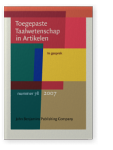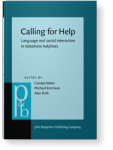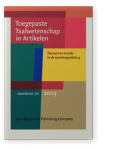Hedwig te Molder
List of John Benjamins publications for which Hedwig te Molder plays a role.
2024 Dealing with the dual demands of expertise and democracy: How experts create proximity to the public without undermining their status as experts Pragmatics and Society 15:6, pp. 858–883 | Article
Credible expertise is no longer a given in our contemporary democracy: for knowledge to be authoritative, experts must take into account a wider audience than just scientific colleagues. This study uses conversation analysis and discursive psychology to investigate how experts deal with this… read more
2021 Withholding consent: How citizens resist expert responses by positioning themselves as ‘the ones to be convinced’ Pragmatics and Society 12:4, pp. 669–695 | Article
This paper examines public meetings in the Netherlands where experts and officials interact with local residents on the human health effects of livestock farming. Using Conversation Analysis, we reveal a ‘weapon of the weak’: a practice by which the residents resist experts’ head start in… read more
2007 Werken Met de 'Discursieve Actie Methode': Jongeren Onderzoeken Eigen Gesprekken In gesprek, pp. 49–59 | Article
This article describes a method that aims to stimulate adolescents to become critically aware of the social practices accomplished through talk. A key feature of the method is that adolescents are invited to analyse their own conversation materials to accomplish this goal. We will explain how… read more
2006 On doing being personal: Citizen talk as an identity-suspending device in public debates on GMOs Analysing Citizenship Talk: Social positioning in political and legal decision-making processes, Hausendorf, Heiko and Alfons Bora (eds.), pp. 276–295 | Article
2005 ‘I just want to hear somebody right now’: Managing identities on a telephone helpline Calling for Help: Language and social interaction in telephone helplines, Baker, Carolyn, Michael Emmison and Alan Firth (eds.), pp. 153–173 | Article
2003 Support as an Accountable Matter Thema's en trends in de sociolinguistiek 4, pp. 103–119 | Article
A detailed examination of participants' everyday conversations in an online support group for people suffering from depression has shown that next to talking about their feelings of depression, participants display a pervasive concern with whether their request for support is appropriate. It was… read more





